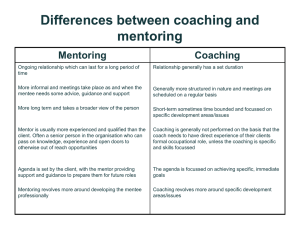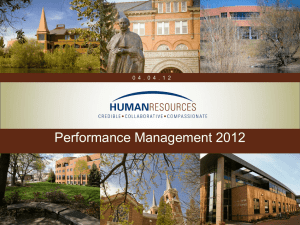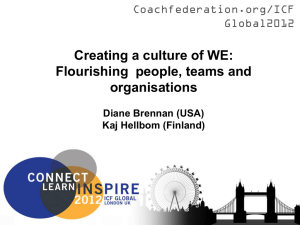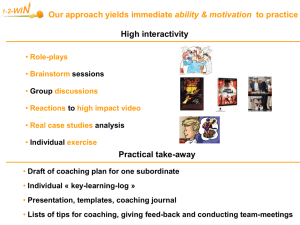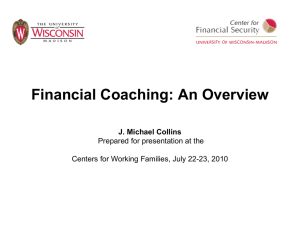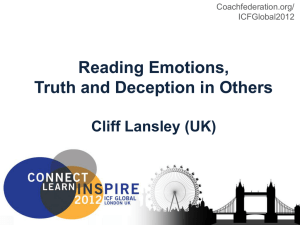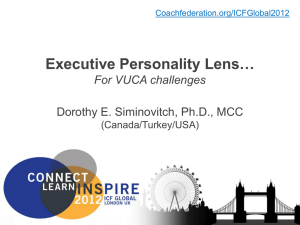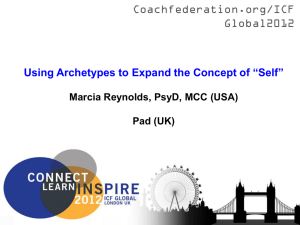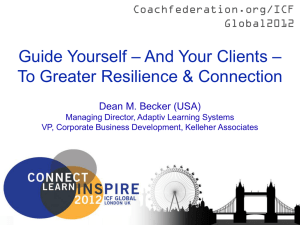Jacqueline-Peters-PowerPoint
advertisement
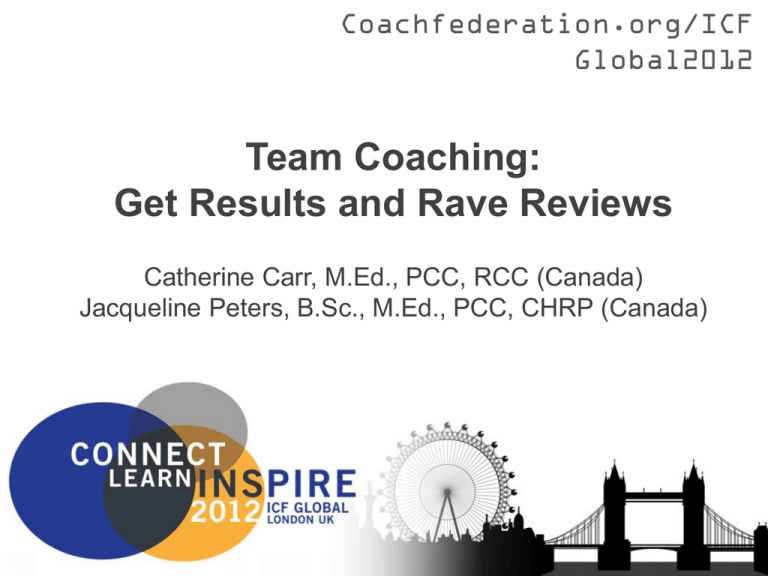
Coachfederation.org/ICF Global2012 Team Coaching: Get Results and Rave Reviews Catherine Carr, M.Ed., PCC, RCC (Canada) Jacqueline Peters, B.Sc., M.Ed., PCC, CHRP (Canada) Coachfederation.org/ICFGlobal2012 Team Coaching? Coachfederation.org/ICFGlobal2012 Coach Reflection How do you define Team Coaching? Coachfederation.org/ICFGlobal2012 Best Team / Worst Team • Best team characteristics (2 to 3) Coachfederation.org/ICFGlobal2012 • Worst team characteristics (2 to 3) …Teams do not improve markedly even if all their members receive individual coaching to develop their personal capabilities. Individual coaching can indeed help executives become better leaders in their own right, but the team does not necessarily improve. Team development is not an additive function of the individuals becoming more effective team players, but rather an entirely different capability. (Wageman et al., 2008, p. 161) Coachfederation.org/ICFGlobal2012 Six Conditions for Leadership Team Effectiveness Real Team The Essentials Compelling direction Right People Team Leadership Supportive context Solid Structure The Enablers Team Coaching Coachfederation.org/ICFGlobal2012 From: Wageman, R., Nunes, D., Burruss, J., and Hackman, J. (2008) Senior leadership teams: what it takes to make them great. Coach Reflection How can you use this information about high performance team factors in your practice? Coachfederation.org/ICFGlobal2012 Team Facilitation (Process Focus during team events) Team Performance Coaching (Task and Process Focus) Leadership Team Coaching (Task, Process and Stakeholder Focus) Transformational Leadership Team Coaching (Task, Process, Stakeholder and Organizational Transformation Focus) Systemic Team Coaching (Task, Process, Stakeholder, Organization and System Focus) Based on: Hawkins, P. (2011) Leadership team coaching: developing collective transformational leadership. Coach Reflection • Where does your team coaching currently fit on the continuum? • If you don’t currently coach teams, where do you see starting? • What would it take for you to stretch to the next level of the continuum? Coachfederation.org/ICFGlobal2012 Team Coaching Readiness Assessment • 5 to10 team members • Clear team membership • Purpose for the team to meet regularly • Right team members for team purpose • Leader motivation for team coaching • Team member motivation for team coaching • Able & willing to dedicate time to achieve coaching goals • Obstacles to coaching participation Coachfederation.org/ICFGlobal2012 High Performance Team Coaching …is a comprehensive and systemic approach to support a team to maximize their collective talent and resources to effectively accomplish the work of the team. Coachfederation.org/ICFGlobal2012 End → Integrate Pre Assessment Team Coaching Readiness Team Members Stakeholders Organization Context Review Learning & Successes Team Members Stakeholders Outcomes Coaching for Team Design Ongoing Team Coaching Safety Coach Leader Peer Individual Coaching Midpoint → Review & Realign Team Purpose Team Structure Right Talent Team Launch Leader (ongoing) Team Members Team Charter Compelling Direction Team Goals Working Agreements Quality Outputs Team Capabilities & Relationships Individual Engagement Coachfederation.org/ICFGlobal2012 Team Beginning → Define & Initiate Team Effectiveness High Performance Team Coaching © Carr and Peters, 2012 Sample Team Charter – Date Vision Team Mission or Mandate or Purpose Team Members Values Our Team Norms Key Goals Success Measures It’s all about Performance! Coachfederation.org/ICFGlobal2012 Based on what we have shared ….How can you make your team coaching more valuable, not just interesting and insightful? Coachfederation.org/ICFGlobal2012 Selected Key References • Buljac-Samardžić, M. (2012) Healthy teams: analyzing and improving team performance in long term care. Ph.D. thesis, Erasmus University. • Clutterbuck, D. (2007) Coaching the team at work. London: Good News Press. • Gersick, C. (1988) Time and transition in work teams: toward a new model of group development. Academy of Management Journal, 31(1), pp.9-41. • Grant, A. (2009) Workplace, executive and life coaching: an annotated bibliography from the behavioural science and business literature. Coaching Psychology Unit, University of Sydney, Australia. • Hackman, J. and O’Connor, M. (2005). What makes for a great analytic team? Individual vs. team approaches to intelligence analysis. Washington, DC, Intelligence Science Board, Office of the Director of Central Intelligence. • Hackman, J. and Wageman, R. (2005) A theory of team coaching, Academy of Management Review, 30(2), pp.269–287. 9Coachfederation.org/ICFGlobal2012 April 2015 Team Coaching: A Dual 16 Selected Key References continued • Losada M, and Heaphy E. (2004) The role of positivity and negativity in the performance of business teams. The American Behavioral Scientist, 47, pp.740765. • Mathieu, J., Maynard, T., Rapp, T., and Gilson, L. (2008) Team effectiveness 1997-2007: a review of recent advancements and a glimpse into the future. Journal of Management, 34(23), pp.410-476. • Stake, R. (2006) Multiple case study analysis. New York, NY: The Guilford Press. • Wageman, R., Hackman, J., and Lehman, E. (2005) Team diagnostic survey: development of an instrument. Journal of Applied Behavioral Science, 41, pp.373-398. • Wageman, R., Nunes, D., Burruss, J., and Hackman, J. (2008) Senior leadership teams: what it takes to make them great. Boston, Harvard Business School Publishing Corporation. • Yin, R. (2009) Case study research: design and Methods, 4th ed. Thousand Oaks, California, Sage Publications Inc. Coachfederation.org/ICFGlobal2012 17 Thank you! www.InnerActiveLeadership.ca High Performance Team Coaching – LinkedIn Group • Catherine Carr, M.Ed., PCC, RCC (Canada) –Catcarr@shaw.ca • Jacqueline Peters, B.Sc., M.Ed., PCC, CHRP (Canada) –Jacqueline.Peters@InnerActive.ca Coachfederation.org/ICFGlobal2012
